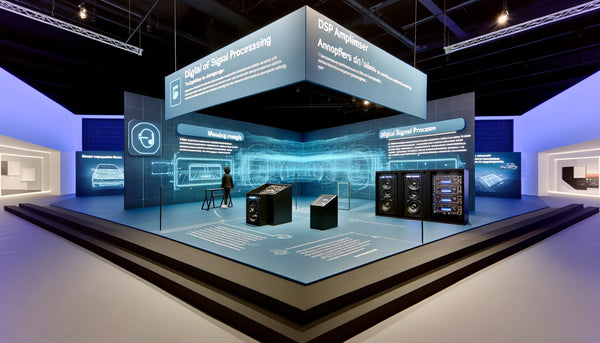
Understanding DSP Amplifier Meaning: A Complete Guide
In the world of audio technology, digital signal processing (DSP) amplifiers have revolutionized how we experience sound. These sophisticated devices combine the power of amplifiers with the computational capabilities of digital signal processors, resulting in enhanced audio quality and a wide range of sound adjustments. Whether you are an audiophile, a car audio enthusiast, or simply someone who appreciates high-quality sound, understanding the DSP amplifier meaning in conjunction with a car stereo system does a great job of helping you fine-tune your sound to perfection. This is made possible by using professional tuning tools, such as built-in real-time analyzers, which visualize system response and allow for precise adjustments. For those looking for even more precise tuning, additional tools and devices are available to help achieve the perfect sound.
The Underlying Principle of DSP Amplifiers
DSP amplifiers operate on the underlying principle of digital signal processing, which involves manipulating audio signals using mathematical functions and computational algorithms. These amplifiers can optimize frequency response, adjust time alignment, and correct audio signal imperfections by processing digital signals, resulting in improved sound quality and a more immersive listening experience.
Basics of Digital Signal Processing

At the core of DSP amplifiers lies digital signal processing, which focuses on processing, analyzing, and manipulating digital signals to enhance their quality. A digital signal represents audio data as a sequence of numbers, allowing for precise mathematical operations to be performed on the signal.
Digital signal processing techniques use mathematical functions and computational algorithms to optimize audio signals. These functions include filtering, equalization, time alignment, and dynamic range compression. DSP amplifiers can significantly improve audio systems' sound quality by applying these functions.
DSP amplifiers can analyze audio signals in real time through computational algorithms, adjusting parameters such as frequency response, time alignment, and signal dynamics. These algorithms allow for precise control over specific frequencies, enabling the amplifier to optimize audio quality for different types of audio content and listening environments.
Role of Amplifiers in Signal Processing

Amplifiers play a crucial role in signal processing, including DSP amplifiers. "DSP amp" refers to an amplifier incorporating digital signal processing capabilities, allowing for advanced sound adjustments and optimization.
In signal processing, amplifiers serve two primary functions. First, they boost the audio signal, increasing its power to drive speakers and produce sound. The audio signal may be too weak to be heard or lack the necessary power for high-quality sound reproduction without amplification.
Second, amplifiers help maintain the integrity of the original audio signal. A signal processor, such as a DSP amplifier, ensures that the audio signal remains faithful to the original recording by reproducing it accurately. This ensures that the audio content's nuances, dynamics, and details are preserved, resulting in a more realistic and immersive listening experience.
In the case of DSP amplifiers, the signal processing capabilities go beyond traditional amplification functions. These amplifiers integrate digital signal processors, allowing for real-time adjustments and enhancements to the audio signal. By combining amplification and digital signal processing, DSP amplifiers provide a comprehensive solution for optimizing audio quality in sound systems and bridging the gap between digital signals and the real world.
What are the advantages of using a DSP amplifier?

Using a DSP amplifier offers several advantages, including improved sound quality, precise control over audio signals, flexibility in adjusting and fine-tuning sound settings, reduced distortion and noise, and the ability to customize audio output based on specific needs or preferences.
Differentiating Between DSP and Regular Amplifiers
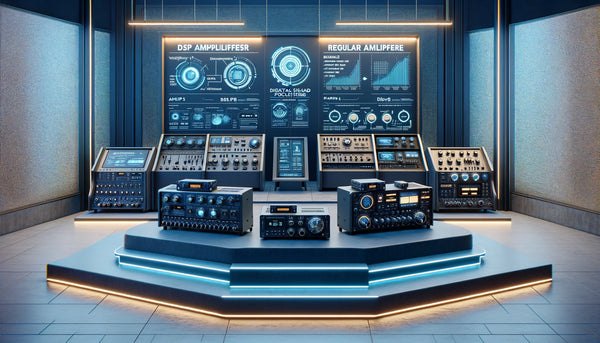
While regular amplifiers serve as the backbone of audio systems, DSP amplifiers offer additional features and capabilities that set them apart. Understanding the critical differences between these two amplifier types is crucial for choosing the suitable amplifier for your specific audio needs.
Key Differences in Features
When comparing DSP amplifiers and regular amplifiers, several key differences become apparent:
- Frequency response optimization: DSP amplifiers allow for precise frequency response adjustment, enabling fine-tuning of audio characteristics such as bass, midrange, and treble frequencies. Regular amplifiers may have limited control over frequency response, resulting in less flexibility in sound adjustments.
- Time alignment capabilities: DSP amplifiers offer the ability to adjust time alignment, ensuring that sound from different speakers reaches the listener's ears simultaneously. This eliminates issues such as phase cancellation and improves sound imaging and localization. Regular amplifiers typically lack this time alignment feature.
- Specific features for audio optimization: DSP amplifiers often include specific features tailored for audio optimization, such as voice recognition, tone controls, and audio signal processing algorithms. These features allow for personalized sound adjustments and enhanced audio quality. Regular amplifiers may not offer these advanced features.
- Seamless integration with digital signal processing: DSP amplifiers are designed to work seamlessly with digital signal processing algorithms, allowing for real-time adjustments and optimizations. Regular amplifiers may not have this level of integration, limiting their ability to provide dynamic sound adjustments.
Performance Comparison
Regarding performance, DSP amplifiers have a clear edge over regular amplifiers. DSP amplifiers' advanced signal processing capabilities improve sound quality, enhanced audio performance, and a more immersive listening experience. Here are some key performance advantages of DSP amplifiers:
- Enhanced sound quality: DSP amplifiers can optimize frequency response, correct audio signal imperfections, and adjust time alignment, resulting in superior sound quality compared to regular amplifiers. This means cleaner audio reproduction, better separation of audio elements, and an overall more enjoyable listening experience.
- Fine-tuned audio adjustments: DSP amplifiers offer extensive control over audio parameters, including frequency response, time alignment, and signal dynamics. This allows users to customize the sound according to their preferences and the specific characteristics of their listening environment. Regular amplifiers may offer limited control over these parameters, limiting the user's ability to achieve optimal audio quality.
- Real-time audio processing: DSP amplifiers process audio signals in real time, making adjustments on the fly. Sound setting changes are instantly applied, allowing users to fine-tune the audio experience according to their preferences. Regular amplifiers may require manual adjustment of audio settings and lack real-time processing capabilities.
- Immersive soundstage: DSP amplifiers utilize advanced signal processing algorithms to create a more immersive soundstage. By optimizing frequency response, time alignment, and signal dynamics, DSP amplifiers can produce a sound image that is wider, more detailed, and better localized. This enhances the overall listening experience, making it more realistic and engaging.
Importance of DSP in Car Audio Systems
The importance of DSP amplifiers in-car audio systems cannot be overstated. These amplifiers offer a range of benefits that significantly improve audio quality and overall listening experience, whether you're cruising down the highway or enjoying a road trip.
DSP Amplifier Meaning:
In car audio systems, DSP power amplifiers, along with the right speakers, enhance audio quality by addressing specific challenges related to the vehicle environment. Here's how DSP amplifiers improve car audio quality:
- Optimized sound reproduction: DSP amplifiers optimize sound reproduction in-car audio systems, ensuring the audio content sounds its best. The amplifiers can adjust frequency response, correct audio signal imperfections, and enhance specific audio elements, such as high frequencies. This results in a more balanced and immersive audio experience.
- Improved speaker system performance: DSP amplifiers power car speakers, providing sufficient power to deliver high-quality sound. This helps overcome car audio systems' limitations, particularly in speaker power handling and frequency response. DSP amplifiers ensure speakers are driven effectively, resulting in better audio performance and reduced distortion.
- Precise sound tuning: DSP amplifiers offer extensive sound tuning capabilities, allowing users to customize the audio experience in their car. With tone controls, equalization, and time alignment, users can fine-tune the sound to their preferences, compensating for the acoustic characteristics of the car interior and personal listening preferences.
- Compensation for ambient noise: Car audio systems often encounter noise from road traffic, engine sounds, and wind. DSP amplifiers can help reduce the impact of ambient noise, ensuring that the audio content remains clear and intelligible. By processing the audio signal, DSP amplifiers can minimize the effect of ambient noise, improving audio quality and overall listening comfort.
Reducing Ambient Noise through DSPs
One of the significant challenges in-car audio systems is combating ambient noise that can interfere with the listening experience. DSP amplifiers, equipped with digital signal processors, reduce ambient noise and ensure a clean audio environment.
Ambient noise, such as road noise, engine rumble, and wind noise, can mask audio content, making it difficult to hear details and impacting sound quality. DSP amplifiers employ advanced algorithms to analyze and process the audio signal in real time, identifying and reducing specific frequencies associated with ambient noise. This ensures that the audio content remains clear, even in noisy environments.
DSP amplifiers can also apply specific noise-canceling algorithms to eliminate specific ambient noise frequencies, ensuring the audio signal is not compromised. By reducing ambient noise, DSP amplifiers create simple ways enhance overall audio quality, resulting in a more enjoyable listening experience in car audio systems.
How DSP Amplifiers Work
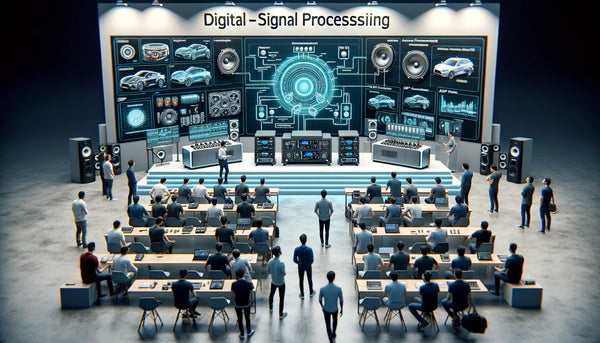
The sound quality provided by DSP amplifiers is the result of their advanced functionality and integration of digital signal processing techniques. Understanding how these amplifiers work to improve sound quality gives insight into their capabilities and benefits.
Functionality of DSP Amplifiers
DSP amplifiers rely on the functionality of digital signal processors, specialized microchips capable of performing complex mathematical operations on audio signals. These processors analyze, modify, and manipulate audio signals in real time, improving their quality and adjusting various audio parameters.
One of the critical functions of DSP amplifiers is frequency response optimization. These amplifiers can adjust frequency response across different frequency bands, allowing for precise control of bass, midrange, and treble frequencies. By manipulating the frequency response, DSP amplifiers correct audio imperfections, enhance specific audio elements, and tailor the sound to personal preferences.
Another necessary functionality of DSP amplifiers is time alignment. These amplifiers can adjust the time delay between speakers, ensuring that sound from different speakers reaches the listener's ears simultaneously. This eliminates phase cancellation effects, enhances sound imaging, and creates a more immersive soundstage.
DSP amplifiers achieve this functionality through computational algorithms that perform real-time calculations and adjustments. These algorithms are designed to optimize audio quality, correct audio signal imperfections, and provide a personalized listening experience.
Impact of DSPs on Sound System Performance
The impact of DSP amplifiers on sound system performance in real-world applications is significant. By leveraging digital signal processing capabilities, DSP amplifiers bring notable changes and improvements to audio quality and system performance.
DSP amplifiers can dramatically change audio performance in sound systems, resulting in a more immersive and enjoyable listening experience. By optimizing frequency response, adjusting time alignment, and correcting audio signal imperfections, DSP amplifiers ensure that sound is reproduced accurately, maintaining the nuances and dynamics of the original audio content.
DSP amplifiers often feature specific features, such as voice recognition, tone controls, and real-time adjustments, enhancing sound system performance. Voice recognition allows for hands-free operation and voice-controlled sound adjustments, while tone controls provide customization options to suit personal preferences.
Overall, the impact of DSP amplifiers on sound system performance is revolutionary. These amplifiers bring scientific precision and engineering excellence to audio systems, enabling users to experience sound in new and immersive ways.
Choosing the Right DSP Amplifier for Your Needs
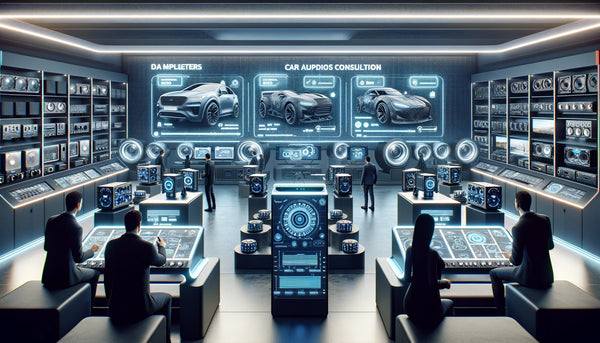
Choosing the suitable DSP amplifier for your audio needs is crucial to ensure optimal audio quality and system performance. Understanding what factors to consider will help you make an informed decision and select an amplifier that meets your requirements.
What to Look for in a DSP Amplifier?
When searching for a DSP amplifier, consider the following factors:
- Compatibility with speakers: Ensure that the amplifier is compatible with your speakers and can effectively power them. Different speakers have different power requirements, impedance ratings, and frequency response characteristics, so choosing an amplifier to drive your speakers effectively is essential.
- Tone controls: Look for a DSP amplifier that offers tone controls, providing you with the ability to adjust bass, midrange, and treble frequencies to suit your personal preferences. Tone controls allow for fine-tuning of the audio experience, ensuring the sound matches your sonic preferences.
- Faithful reproduction of original signal: A quality DSP amplifier will faithfully reproduce the original audio signal without introducing distortion or coloration. This ensures that the audio content is reproduced with great accuracy, preserving the original intent of the recording.
- Computational algorithms: Consider the computational algorithms used in the DSP amplifier. Look for amplifiers that utilize advanced algorithms backed by extensive research to optimize audio quality and provide a wide range of sound adjustments.
- Integration and compatibility: Ensure the DSP amplifier integrates seamlessly with your audio system components, such as head units, speakers, and other audio processing devices. Compatibility ensures optimal performance and ease of use.
Compatibility and Integration Factors
Compatibility and integration with your audio system components are crucial for optimal performance when choosing a DSP amplifier. Consider the following factors:
- Compatibility with head units: Ensure that the DSP amplifier is compatible with your head unit, as this is the primary control unit for your audio system. Compatibility ensures seamless integration and allows for easy access to sound adjustment features.
- Integration with car speakers: Choose a DSP amplifier that works well with your speakers, considering power handling capabilities, impedance ratings, and frequency response characteristics. Proper integration ensures that the amplifier can effectively power and optimize the performance of your speakers.
- Adjustments for different distances: Look for a DSP amplifier that offers adjustment options for different distances between speakers. This allows you to fine-tune the time alignment of audio signals, ensuring that sound from different speakers reaches your ears simultaneously. Proper time alignment enhances sound imaging and creates a more immersive listening experience.
Balancing Budget and Value for Money
When choosing a DSP amplifier, balancing budget considerations and value for money is essential. Consider the following factors:
- Value for money: Evaluate the features and performance of the DSP amplifier and consider how they align with your audio needs. Look for an amplifier that offers extensive research-backed computational algorithms, sound quality enhancements, and a wide range of audio adjustments without compromising your budget.
- Power considerations: DSP amplifiers often prioritize sound quality over raw power output. While regular amplifiers may offer more power, DSP amplifiers provide dramatic changes in sound quality with less power. Consider how much power you need for your specific audio system requirements.
- Budget considerations: Determine your budget for a DSP amplifier and explore the options available within that budget range. Remember to prioritize features and performance that are most important to you rather than solely focusing on price. Investing in a high-quality DSP amplifier will provide long-term audio benefits and enhance your overall listening experience.
Top Models of DSP Amplifiers in the Market
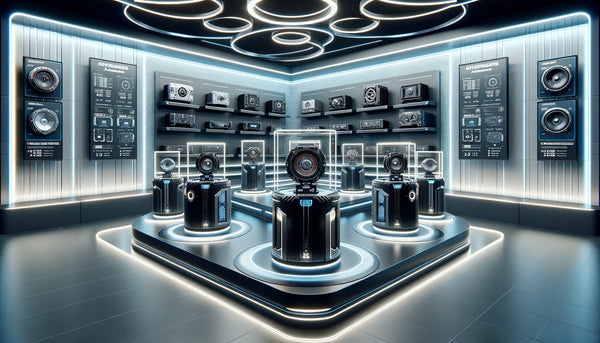
With the increasing popularity of DSP amplifiers, several top models have emerged in the market, offering exceptional sound quality, extensive features, and advanced signal processing capabilities.
Overview of Best DSP Amplifier Models
Here's an overview of some of the best DSP amplifier models available in the market:
- Goldhorn DSPA 1012 Plus | 20 Channel DSP / 8 x 80w + 2 x 150w Amplifier: This DSP amplifier from a leading audio brand is known for its extensive research-backed computational algorithms, delivering exceptional sound quality and precise audio adjustments.
- Eton Mini 150.4 DSP 4-Channel Class D Amplifier with 8-channel DSP: Considered one of the market leaders, this DSP amplifier offers revolutionary new methods of sound system enhancement, providing great audio performance and a wide variety of applications.
- Rainbow Audio SL-PA400 8 channel DSP processor: This feature-rich DSP amplifier offers extensive sound tuning capabilities, including tone controls, time alignment, and voice recognition, ensuring excellent audio quality and sound adjustments.
- FEM AUDIO DSP480.6 Pro Tuning Amplifier with DSP: Designed with internal enemies of sound, this DSP amplifier maximizes audio performance, providing perfect sound quality and offering extensive research-backed computational algorithms for wide-ranging applications.
Where to Buy the Best DSP Amplifiers?
To purchase the best DSP amplifiers, consider the following options:
- Retail outlets: Visit authorized retail outlets of audio equipment, where you can experience the amplifiers firsthand and seek expert advice. These outlets may offer competitive prices and provide after-sales support.
- Online stores: Explore reputable online stores specializing in audio equipment, as they often offer various amplifier models, competitive pricing, and convenient home delivery options. Read customer reviews and check product ratings to make an informed decision.
- Authorized dealers: Purchase DSP amplifiers from authorized dealers of specific brands, as they ensure genuine products, extensive research-backed computational algorithms, and internal enemies of sound. Authorized dealers may also offer installation services and technical support to ensure proper amplifier integration into your audio system.
What Does DSP Amplifier Mean for Your Car Audio?
To maximize the performance of your audio system, there are several ways to make the most out of DSP amplifiers. These amplifiers offer extensive sound adjustments, customization options, and optimization features, allowing you to optimize your sound system and achieve the best audio quality possible.
How to Optimize Your Sound System with a DSP Amplifier?
To optimize your sound system with a DSP amplifier, follow these steps:
- Adjust frequency response: Utilize the DSP amplifier's frequency response adjustment capabilities to fine-tune your sound system's audio characteristics. Optimize bass, midrange, and treble frequencies to achieve a balanced sound that suits your listening preferences.
- Ensure speaker system compatibility: Ensure the DSP amplifier is compatible with your speaker system, ensuring optimal power delivery and frequency response alignment. Proper speaker system compatibility ensures the amplifier can drive your speakers effectively, enhancing audio quality and system performance.
- Fine-tune time alignment: Use the time alignment features of the DSP amplifier to compensate for different distances between speakers, ensuring that sound arrives at your ears simultaneously. This enhances sound imaging, localization, and overall soundstage quality.
- Leverage tone controls: Take advantage of tone controls offered by the DSP amplifier to customize your sound experience further. Adjust bass, midrange, and treble levels to match your preferences and listening environment, allowing for a more enjoyable audio experience.
- Explore computational algorithms: Familiarize yourself with the computational algorithms of the DSP amplifier and experiment with different audio adjustments. Discover the features and functions that work best for your audio system, taking into account specific applications, listening preferences, and sonic characteristics.
Conclusion
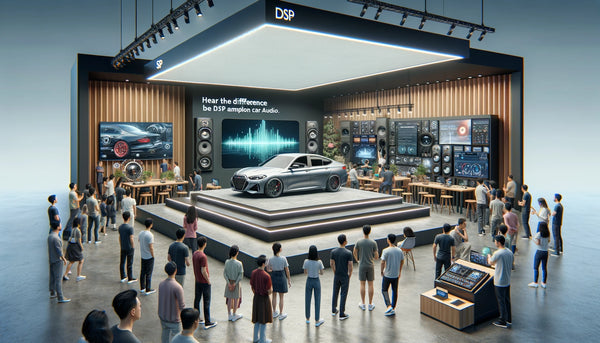
In conclusion, DSP amplifiers have revolutionized the world of audio systems by providing advanced signal processing capabilities. They offer many features that enhance audio quality and reduce ambient noise, making them an excellent choice for car audio systems. DSP amplifiers utilize digital signal processing techniques to optimize sound output and improve the overall performance of the sound system.
When choosing a DSP amplifier, it is essential to consider factors such as compatibility, integration, and value for money. Several top models of DSP amplifiers are available in the market, and you can find them at reputable retailers. To make the most out of your DSP amplifier, optimize your sound system by following the recommended guidelines. Experience the difference in sound quality and take your audio experience to the next level with a DSP amplifier.
Tired of mediocre car audio? Discover how a DSP amplifier can transform your listening experience! Read our ultimate guide for the best sound on the road.

